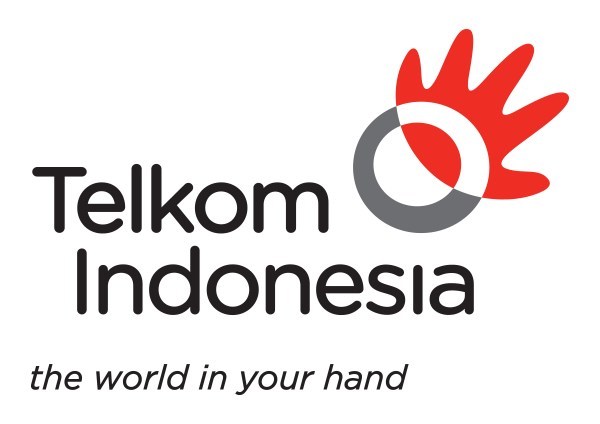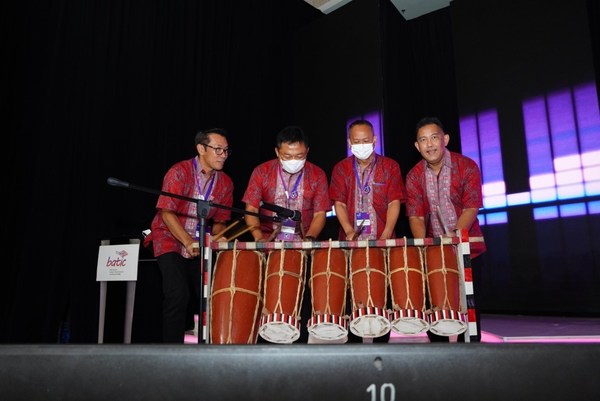BATIC 2022 - TelkomGroup Strengthens Indo-Pacific Connectivity Ecosystem as Regional Digital Hub
ByPublished : Sept. 22, 2022 - 12:30

NUSA DUA, Indonesia, Sept. 22, 2022 /PRNewswire/ -- The Bali Annual Telkom International Conference (BATIC) 2022 held by PT Telkom Indonesia (Persero) Tbk, kicked off Wednesday (21/9) in Nusa Dua, Bali after a two-year hiatus. Telkom Commissioner Marcelino Pandin, Telkom President Director Ririek Adriansyah, Telkom Wholesale & International Service Director Bogi Witjaksono, and Telin CEO Budi Satria Dharma Purba launched the series of international conferences, which serve as a showcase of Indonesia's digital transformation acceleration and collaboration in response to the evolution of the telecommunications world.

Opening ceremony of the BATIC 2022 by Telkom Commissioner Marcelino Pandin (second from right), Telkom President Director Ririek Adriansyah (second from left), Telkom Wholesale & International Service Director Bogi Witjaksono (far right), and Telin CEO Budi Satria Dharma Purba (far left) at the Hilton Hotel, Nusa Dua Bali.
This year's BATIC, themed "Reconnecting Regions, Reviving Digital Ecosystem", emphasizes the strategic role of Indo-Pacific's position as a connectivity and digital hub, which requires development of an adequate and comprehensive ecosystem to make it a reality.
Telkom President Director, Ririek Adriansyah said in his remarks that digitalization has become the main driver of the world's economy and explained about TelkomGroup's role to encourage Indonesia's digitalization.
"Digital transformation is a crucial aspect to boost national competitiveness in economy, government, and society. In strengthening national digitalization, Indonesia must move, we are no longer just a consumer of technology, but we have begun building a local digital industry that will become an enabler for the digitalization of various vertical industries. TelkomGroup is committed to realizing this digitalization by deploying digital infrastructure all over Indonesia and even abroad," Ririek said.
Ririek said that Telkom has been contributing to support the government's national agenda and will continue to do so. "We are very open to collaborate with many strategic partners that will support the company's transformation and jointly develop digitalization in Indonesia," Ririek said.
According to Ririek, Indonesia's digital economy has so far grown higher than other ASEAN countries and Indonesia continues to accelerate digital transformation to increase its competitiveness. The role of economic digitization is important because it is warranted as the silver bullet to achieving all 17 SDG targets by 2030. Moreover, digital economic growth has contributed 15.5% of global GDP, growing 2.5 times faster than world GDP growth for the past 15 years.
"Several countries have also developed their national digital strategies to strengthen their economic competitiveness, such as India, China, Brazil, the European Union, and Switzerland," he said.
Indonesia's digital economy is predicted to grow from 632 trillion rupiah in 2020 to 4,531 trillion rupiah in 2030 or an eight-fold growth. The pace of national GDP grew 1.5 times from 15,400 trillion rupiah to 24,000 trillion rupiah, driven by the digital economy. Compared to the Southeast Asian region, the digital economy will reach US$ 323.6 billion by 2030, the largest among ASEAN countries. In addition, according to Ririek, in the last six years, Indonesia's digital competitiveness index has moved up seven ranks. Likewise, the network readiness index rose 13 ranks.
To achieve this, Ririek said, Indonesia has accelerated and must continue the transformation of its digital economy to strengthen its competitiveness. Secondly, to become a leading economy, Indonesia must transform from a consumer country to a technology producer through development of research & design, ICT manufacturing and software development, and strengthening connectivity.
TelkomGroup, Ririek said, has been contributing to the national digital agenda and will continue to do so, through aggressive investment in connectivity infrastructure, development of the PeduliLindung application, which to date has 100 million users, creating the Satu Data Indonesia platform, developing the Pijar education platform with 1 million monthly active users/MAU, and data center with a capacity of 40 MW.
In addition, TelkomGroup develops digital services, digital platforms, and digital connectivity to strengthen the digital transformation of lifestyle, government, and companies. Telkom contributes to the national digital development agenda through its existing infrastructure, namely 171,654 km fiber optic network, 109 transponders, 255,107 BTS, and 36,787 tower units.
#DigitalBisa
#UntukIndonesiaLebihBaik

















